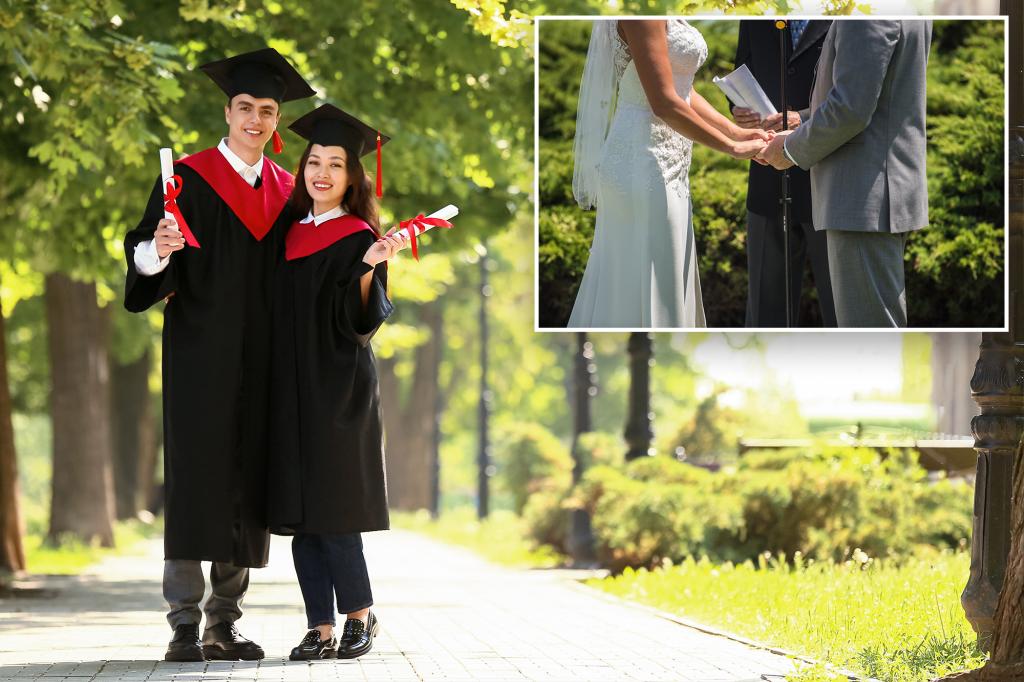College Graduates Prioritizing Careers Over Marriage: A New Social Trend
In recent years, a significant shift has occurred in how young Americans approach marriage and career planning. Gone are the days when wedding bells chimed shortly after graduation ceremonies. Today’s college graduates are increasingly postponing marriage in favor of establishing their careers, gaining independence, and developing their personal identities. This trend, illuminated by recent research from Iowa University published in Education Economics, reveals that higher education is fundamentally reshaping relationship timelines and priorities for millions of Americans. The comprehensive study, which analyzed census data from over eight million people, found that each additional year spent in college reduces the likelihood of marriage between ages 25-34 by approximately four percentage points, painting a picture of a generation that prioritizes professional achievement before making lifelong commitments.
“We found that education changes more than just a person’s resume – it also shifts their opportunities, timelines and expectations,” explains John V. Winters, professor of economics at Iowa State and co-author of the study. This transformation extends beyond mere career prospects; education fundamentally alters what individuals seek in potential partners, their readiness for commitment, and even whether they wish to marry at all. The demographic shift is striking – whereas more than 80% of 25 to 34-year-olds were married in previous generations, by 2023 that figure had plummeted to just 38%, according to Census data. Higher education appears to foster greater selectivity in partner choices, with educated individuals often preferring partners with similar educational backgrounds and willing to extend their search timeline accordingly. This selectivity, combined with increasing economic independence, creates a landscape where marriage is no longer an urgent priority but rather one option among many life paths.
While this trend might initially appear concerning to traditionalists, researchers have discovered an important silver lining: marriages that occur later in life – after career establishment, possible graduate education, and greater life experience – demonstrate significantly lower divorce rates. The data suggests that individuals who wait longer to marry often make more compatible partner selections, having developed clearer understandings of their own needs and values. Rather than rushing into marriage during their twenties, many college graduates are taking time to cultivate their careers, develop financial stability, and explore relationships without immediate pressure to commit. This deliberate approach to partnership formation appears to yield more stable, satisfying unions when marriages do eventually occur. The delay in marriage timing seems to facilitate better decision-making, with individuals choosing partners based on deeper compatibility rather than societal expectations or earlier life pressures.
This relationship revolution is particularly pronounced among women, who appear to be thriving in their independence. A separate study published in Social Psychological and Personality Science reveals that single women report higher levels of happiness, sexual satisfaction, and overall contentment compared to their male counterparts. University of Toronto psychologists Elaine Hoan and Geoff MacDonald discovered that women often maintain rich, supportive platonic relationships that fulfill many emotional needs traditionally associated with romantic partnerships. Single men, by contrast, “have more to gain from partnering than do single women,” according to the researchers. The emotional fulfillment women find outside romantic relationships, combined with their growing financial independence, creates circumstances where marriage becomes truly optional rather than necessary for life satisfaction or security.
The financial landscape further reinforces this trend, with educated women establishing impressive economic independence. Today’s college-educated women are doing remarkably well financially on their own – so well, in fact, that single women now own more homes than single men in the United States. This economic self-sufficiency represents a profound historical shift, eliminating what was once a primary motivation for marriage: financial security. With stable careers and solid financial foundations, many women can approach relationship decisions from a position of choice rather than necessity. They can afford to be selective, waiting for partners who truly enhance their already satisfying lives rather than settling out of economic or social pressure. This position of strength fundamentally alters relationship dynamics and contributes significantly to the marriage delay phenomenon.
As society continues to evolve, these changing patterns in marriage timing and partner selection reflect broader transformations in how Americans conceptualize success, fulfillment, and life planning. Rather than following a standardized timeline of graduation, marriage, and family formation, today’s college graduates are crafting individualized paths that prioritize personal and professional development before commitment. This doesn’t necessarily indicate a rejection of marriage as an institution – rather, it suggests a more thoughtful, deliberate approach to partnership. For many, the goal isn’t to avoid marriage entirely but to enter it from a position of self-knowledge, career stability, and personal maturity. The result appears to be fewer but potentially stronger marriages, with partners who choose each other not out of convention or necessity but from a genuine belief that their union enhances already complete lives. As education continues to transform opportunities and expectations, this trend toward later, more carefully considered marriages seems likely to persist, reshaping the American social landscape for generations to come.


